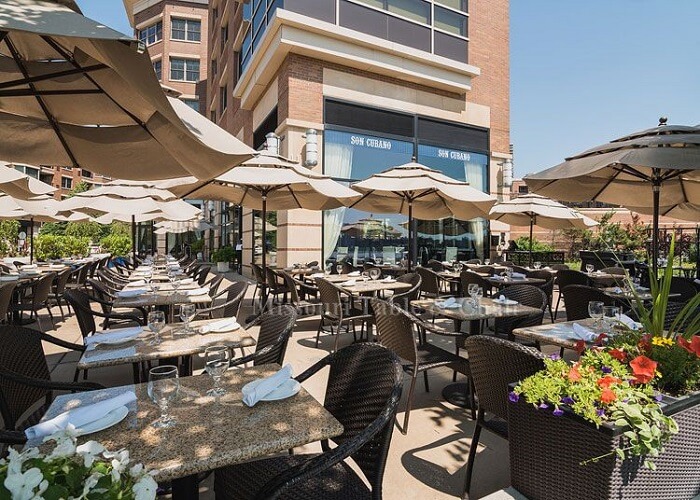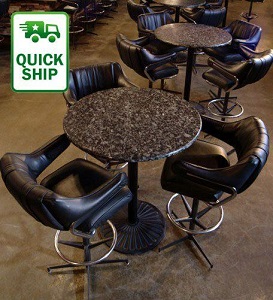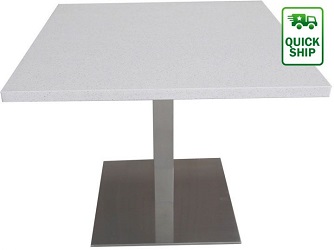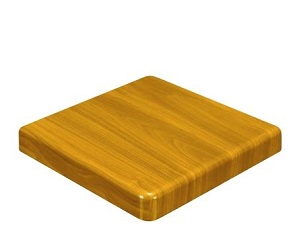Table of Contents
When it comes to choosing a material for your restaurant table tops, the range of materials can be overwhelming. One of the most popular styles of restaurant table tops are smooth surface tops. The most common three smooth surface table options are granite, quartz and resin. Whether you are opening a brand new restaurant or refurbishing your existing one, these three are all popular materials for restaurant table tops. Like any other material, they all have their own benefits and disadvantages. While they might look similar to many people, they have several distinguishable traits and characteristics. So which one is best for your restaurant? We wish the answer was straightforward. Let's understand all of them briefly first:
Table Style Overview
Granite: The exquisite, naturally occurring granite has been the top choice for restaurant table tops for decades now. Granite is an all-natural stone that has been mined, treated, and shaped for use as a table. A coating of protective seal on the surface adds to the durability and makes it visually appealing. Granite has long been a popular choice for restaurant tables due to the fact that every slab of granite is unique.

Resin Solid Surface: The term solid surface in commercial tables refers to an acrylic or plastic material that has been mixed and poured during fabrication processes. It consists of a large percentage of minerals combined with a lesser amount of resins for binding. Modern fabrication techniques facilitate solid surface restaurant table tops in various shapes, sizes, patterns, colors, etc. They are commonly referred to as resin tables in commercial terminology.
Quartz Solid Surface: Commercial quartz table tops are manufactured from quartzite or other crushed stone mixed with binders. Quartzite is a natural stone which is quite expensive in its natural state and rarely used in commercial table tops. The manufactured quartz tables maintain the sleek, shiny look of quartzite at a much lower cost.
Now that you know the materials, read on to understand their properties, behavior, differences, pros, and cons before making your selection:
A. Cost comparison between granite, resin and quartz
Granite is a natural stone and is limited in supply. As such, it does cost more than some other table top materials. Our granite restaurant table tops have a 3/4" plywood core so that they are less expensive than a top made completely of granite, and also makes them lighter weight and easier to attach a table base. Many customers will purchase a few granite table tops as focal pieces for their restaurant dining room, and complement them with matching resin or laminate table tops.
Quartz table tops continue to be one of the hottest trends in restaurant and residential tables and countertops. Quartz has a particular shine and sleek look that is in high demand in part because it is easy to keep clean and looking fantastic. Quartz also is one of the more expensive restaurant table top options, in part because of its durability but also due to its being in so high demand. Just like granite, you can match it with less expensive table options to save money.
Resin table tops come in many sizes, styles and patterns. As they are man-made manufactured table tops, just about any design can be made into a resin table if mixed correctly. Resin tables are also easy to clean and maintain and are quite durable. Resin tables are a good looking and economical choice for restaurant tables. They may lack the elegant shine of granite or quartz, but they are quite attractive in their own right. They are usually the least expensive table top style of these three smooth surface table top styles.
B. Maintenance differences between granite, quartz and resin table tops
Granite table tops are highly durable and require minimum maintenance. However, granite is a brittle material and is prone to crack. Granite table tops can require sealing every couple of years, and acidic materials like citrus juices, vinegar, etc., can etch the surface. The natural variation in granite table tops hides many scratches, stains and or imperfections though.
Although resin solid surface table tops are susceptible to scratches, you can use pads to buff out minor scratches or marks. Also, solid surface table tops are not porous and do not require periodic sealing. Usually resin tables just need wiped down with a damp cloth and dried thoroughly. Minor scratches can be buffed out.
Quartz table tops are arguably the most durable of the three types. It also isn't porous like granite table tops. One drawback is quartz can be harder to repair if it is scratched or damaged. Quartz table tops also mostly need just to be kept clean and free of debris and dried thoroughly, so maintenance is quite easy.
C. Value of granite, quartz and resin table tops
Granite table tops are durable, last long, visually appealing, and look premium. Despite being more expensive initially, they add value to any theme in your restaurant and offer great returns on your investment.
Quartz table tops, just like granite, are a premium product that is very durable and long lasting and a great return on investment in the long run. Quartz is arguably the most popular table top currently, so you won't be behind the trend if you purchase now. They are also virtually maintenance free saving you in upkeep costs.
Resin solid surface table tops might save you money initially, but they lack the premium appeal of granite or quartz. If you're looking at granite or quartz in the longer term, it may best to purchase those table tops initially due to their longevity. Solid surface resin table tops have a smooth, fun look that is very attractive in its own right and are very durable.
Key Characteristics and Considerations
1. Color and pattern variation
Granite, being a natural stone, is famous for its unique and dramatic pattern. Since every slab of granite is one of its kinds, it stands out in any ambiance. The bold look, deep luster, and color variation of granite draws attention, they also hide stains or smudges on the on the surface. Resin table tops, being artificially made, are available in a wide range of colors, shapes, patterns, etc., and they are available in patterns that mimic natural stone. Quartz also can have a wide range of colors and patterns. The biggest difference in the look of solid surface resin or quartz is that resin has a matte appearance while quartz is more similar to natural stone with a high sheen and silky smooth surface. You can create a uniform, homogenous appearance throughout your restaurant with solid surface table tops. In a restaurant, uniformity of colors and patterns might come handy if you want to replace some table tops or extend your seating capacity.
2. Durability
Although granite is a durable and strong material, it is prone to cracking and chipping. Moreover, it has a porous surface and requires regular sealing to ensure its strength and durability. With proper maintenance quartz and granite have a very long life span. Resin table tops are prone to scratches or heat damage, and their life span is shorter. Resin table tops are still a solid choice in durability and value, and a terrific alternative if quartz and granite are simply out of your budget range.
3. Scratch resistance
Granite is an inert stone and has survived millions of years under the earth's surface. It is extremely hard and difficult to scratch. Quartz is also very difficult to scratch and resin slightly less so. If yours is a busy family restaurant, you may need to consider scratch resistant your table tops need to be.
4. Heat resistance
Granite can withstand temperatures as high as 1200°F (~650°C), significantly more than what you expect in your restaurant. On the other hand, solid surface resin and quartz table tops can handle temperatures up to around 150°F, and anything too hot placed on the table top can scorch it. A restaurant that often uses very hot plates may want to lean towards granite table tops.
5. Porosity
No matter how cautious your staff or guests are, there will be spills and stains in a restaurant. Granite consists of natural pores that allow water or juices to seep inside. Over time, if you are not careful, porous granite results in a stained surface. That's the reason why granite table tops require sealing once every 2-4 years. Unlike granite, the resin and quartz do not require any sealing.
6. Antibacterial property
In a post-Covid-19 world, emphasis on a hygienic and germ-free environment is paramount. Granite is one of the most sanitary options for table tops as it does not harbor bacteria. The surface seal protects against bacteria, and even if there is a breach in the seal, the stone is unlikely to harbor bacteria. The antibacterial property of granite makes it invaluable in hospitality and healthcare applications like hospitals, restaurants, bathrooms, doctors' offices, gyms, etc.
7. Care and Maintenance
Granite may be the hardest material that offers sufficient resistance to scratches, but it requires care. While most granite table tops come factory sealed, they need resealing periodically. Also, they are susceptible to cracking. Solid surface table tops like quartz and resin, on the other hand, are inherently low-maintenance. Although they are prone to scratches or dents, you can buff them out without much effort. Moreover, they do not require any continuous sealing.
The Bottom Line:
So, quartz vs. granite vs. resin table tops for your restaurant, who is the winner?
Well, the choice depends on your budget, your personal taste, and preferences. While granite continues to be the top of the line material for restaurant table tops with their ultimate performance, quartz and its ease of maintenance and sleek lines is arguably just as popular. Resin table tops, with their dizzying array of colors and patterns, and their budget friendly prices are always a top choice with restaurant owners. If you want a practical, no-nonsense table top with a consistent look on a budget, go with resin table tops. On the other hand, if you're buying for the long term and can afford granite or quart initially, go for those and make your restaurant stand out. With any table top material, first consider your customer base and whether the materials will suite the style of your restaurant theme and layout.
These are just a few of the properties, differences, pros, and cons of granite and solid surface as a table top material for your restaurant. Hopefully, you can now make an informed decision to select the best material for your restaurant.
FAQs
Q: Which is cheaper solid surface or granite?
A: Solid surface resin table tops are generally cheaper than solid surface quartz table tops and their granite equivalents.
Q: Which table top surface is the best?
A: There is no one best table top surface. It depends on the style of your restaurant, the types of customers you serve and other factors. Solid surface is practical and cost-effective table top material for your restaurant. However, if you want returns on your investment and stunning table top design, go for granite or quartz.
Q: How durable are granite table tops?
A: Properly maintained granite table tops are one of the longest lasting table top materials. Although granite is scratch-proof and heat-resistant, it is brittle and prone to etching.
Q: Why are solid surface quartz table tops so popular?
A: Quartz table tops have a stunning sleek appearance that just looks great anywhere. Add to that they are almost maintenance free and you can see why they are currently many restaurant owners top choice.





